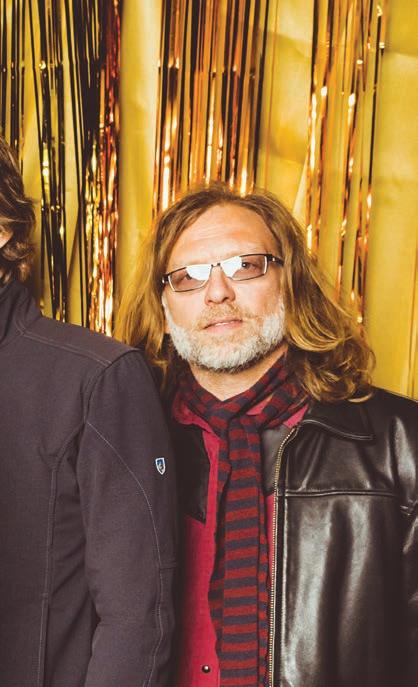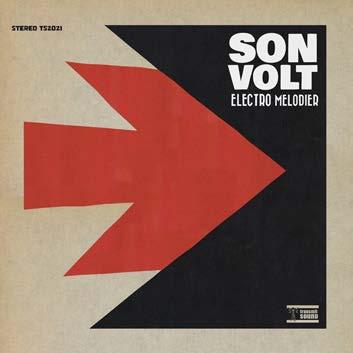
8 minute read
HIGH VOLTAGE
Son Volt’s new album Electro Melodier takes its title from two vintage amplifiers – a reflection of the sound within.
By Brian Wise
Advertisement
When the history of the Americana movement is written Jay Farrar’s name should be prominent. As a member of Uncle Tupelo with Jeff Tweedy he was one of the prime movers of what became the No Depression movement. The name was taken from a vintage Carter Family song that became an Uncle Tupelo album title within the alternative country (or alt.country) genre that was eventually subsumed into Americana. With the demise of Uncle Tupelo, Tweedy formed Wilco and Farrar went on to form Son Volt, a band that has probably kept closer to alt.country throughout its now 26 year history. Apart from some solo albums in the early part of this century and several collaborations, Farrar has been happy to record over the past 15 years under the Son Volt moniker with a shifting cast of other musicians. Electro Melodier, named after two vintage amplifiers from the ‘40s and ’50s, is the tenth album from Son Volt, and while it continues some of the political preoccupations of its predecessor Union in 2019 its musical scope is wider with echoes of folk, country, blues, soul and rock. Trainspotters will find the Moog line from The Who’s ‘Won’t Get Fooled Again’ in ‘The Globe’ and a Led Zeppelin homage in ‘Someday Is Now.’ Farrar cites the Mississippi delta blues of Lightnin’ Hopkins in ‘War on Misery’ and ‘The Levee On Down.’ There is plenty of social commentary on songs such as ‘Living in the U.S.A.’, ‘The Globe,’ (about the Black Lives Matter movement); but there are also songs drawn from Farrar’s relationships, personal experiences as well as his reading and observations. Farrar’s songs can also be complex. ‘Arkey Blue’ is a reference to a honky-tonk in Bandera, TX, where Hank Williams, Sr. allegedly carved his name into one of the wood tables but also contains references to a speech by Pope Francis on environmental change! The past year has given Farrar time to focus on his writing and recording and, when we catch up, he is at home in St Louis, Missouri, preparing to (hopefully) go out on tour to promote the new album. “Normally we just record in between playing shows,” explains Farrar, “but this time with the lockdown and the pandemic I was allowed to just devote a singular focus, I think, to the writing of the songs all the way through to the recording and each part of the recording. It spanned over a couple of months, which is somewhat unusual for Son Volt.” “It hints at that duality that’s always been there with Son Volt’s sound, acoustic and electric both,” he replies when I ask him about the album title’s reference to vintage amplifiers. “Melodier is not a real word, it’s not in the dictionary actually, but I’ve always been drawn to the names of amplifiers from the 1950s. There was that timeframe that saw convergence of space exploration terms like a rocket and Saturn and Stratotone and things like that. But also, it just seemed like they would really just slap any interesting word on an amplifier back then. But Melodier struck me as maybe a word that should be a word. Someone or something that puts out a melody. I felt like Electro Melodier would be emblematic and representative as a title of this group of songs. Focusing on melody’s something that I wanted to do, and I felt like the end result reflects that.” In his recent memoir, Unstrung, guitarist Marc Ribot writes about the joy of playing

loud through smaller vintage amps, saying that he much prefers ‘the subtler but less predictable distortions of the ‘40s and ’50s (e.g. Charlie Christian, Hubert Sumlin, Pee Wee Crayton, Ike Turner), a time when amp designers weren’t such wiseasses’. “Those are the amps that are the most sought after - the smaller amps from the ‘50s,” adds Farrar. “Someone asked me the other day why that is, and I still don’t have a great answer. It’s a visceral thing. I think that technically the answer must be that there’s a natural compression that occurs when that amp is turned all the way up. It just sounds good. It’s also probably a little easier to capture and control than having a Marshall stack blasting away.” Farrar mentions that for years he played wide bodied guitars but due to an operation on his shoulder he has found some older, thinner guitars such as the Kay Speed Demon. “They’re just a one pickup model,” he notes, “but I’ve modified it by putting in an acoustic guitar pickup on there and blending those sounds. I have two of them. I’ll be using those live. The physical therapist I was working with said, ‘No more wide body guitars for you pal’ and I said, ‘Okay’.” There are a lot of different elements to the sound on Electro Melodier, including a soulful element, on the song ‘Lucky Ones,’ due to the organ. There’s also the bluesy element on ‘War on Misery’. “I think you’re right about both of those,” he agrees. “I’ve always been drawn to where there were crosscurrents of R&B, soul, and country music, whether it was Dan Penn or Charlie Rich, or The Flying Burrito Brothers. They dabbled in some R&B soul. I guess I finally decided I wanted to try that, and out came ‘The Lucky Ones’. Mark Spencer had a nice organ solo on that one. “The other song you mentioned, ‘War on Misery’, I was going for more of a Lightnin’ Hopkins sound. There’s a couple of his songs he recorded with a low tune guitar that I thought were really great. I have a baritone acoustic guitar which does a similar thing. So, I gave it a shot with that.”
The acoustic ‘Rebetika’ may have a title that refers to a Greek style of music but it does not feature bouzouki and the lyrics refer to hard times ahead. “It piqued my interest,” says Farrar of the term. I just wrote it down, something I wanted to investigate and that for whatever reason didn’t get around to it, but I hope to, before I die. Because it was described as like a Greek form of blues music. Anyway, I stuck with the title and a song came out of that.” Son Volt’s last album, Union, was a powerful political statement and the new record also contains a lot of social commentary but does he think it is as overtly political? “I don’t think so,” replies Farrar. “At least I started out with the mindset that it wouldn’t be overt. I think that’s typically the way I work is that I’ll start off with an idea and run with it for as long as I can until I start. So, my original idea was to pretty much to keep politics out of it. I got so far with that until I just started reading the news again and topical ideas started finding a way back into the writing of a song, like ‘The Globe’, where I was just seeing parallels of people here out on the streets protesting for the Black Lives Matter movement and then seeing on the news folks in Belarus or Russia just out protesting on the street for basic freedoms. I felt like there’s a sort of solidarity across the world and that’s what I was getting at with the song. Then with a song like ‘Living in the USA’, the pandemic was the backdrop, but also again Black Lives Matter, and I guess some of the social inequalities that exist in America are pretty stark and some of that made it into that song.” “Also, in the song ‘Arkey Blue’ there’s actually a few lines that were directly from Pope Francis, who had put out a statement saying that he felt like the pandemic was potentially the Earth’s way of fighting back, and I can relate to that.” Somehow, Farrar was able to link the Bandera, Texas, legend Arkey Blue and his Silver Dollar Bar – famous for a visit by Hank Williams Sr – and The Pope! “I just took a trip there one time and checked out the place,” he explains. “Definitely dripping with ambience and history. There’s a little wooden table that they kind of roped off where Hank Williams Sr, carved his name into it, because he used to play there. It still seemed like it was a scene straight out of the 1950s or ‘40s. Jukebox stocked with old records. There’s some early cross-pollination of music that occurred in Texas. The Germans and Czechs moved in and some of that polka type stuff still carries on there and an interest in that type of music. Could this be the first song ever to link Hank Williams Sr. with a speech by a Pope? “All right. I think you might be right,” laughs Farrar. “The first and the last, probably.” ‘Living in the USA’ is quite different in sentiment to the phrase used by Chuck Berry in the song ‘Back in the USA’ or Steve Miller’s ‘Living in the USA’ from 1968. “I think so. Yes,” agrees Farrar. “I was taking more of a critical eye, more of a critical view of what’s going on in the United States. We’re potentially headed in the right direction, but there’s some real serious problems, I would say, as you probably well know.” The last album of course came out in a particularly turbulent time. Have things got better this year? Farrar would have written the songs for the new album last year while the whole election process was taking place and probably even recorded it before the election. “A lot of it was recorded before the election, that’s right,” he says. “Even before the election, there was a sense that maybe the tide was turning in the right direction. So, I just felt like there had to be the hope that people will start to see the collective right path. Fortunately, at least I feel like we’re on the right path right now.”
Electro Melodier is available now through Cooking Vinyl Australia.












